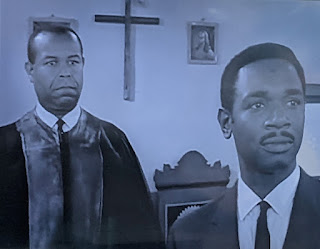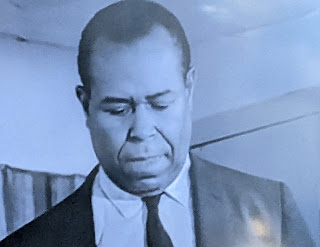Nothing But a Man (1964)
Though it's not written or directed by African American filmmakers, 1964’s Nothing But a Man has an important place in the history of African American films.
The film’s director, Michael Roemer, was born into a poor Jewish household in Berlin in 1928. His father had trouble getting work due to antisemitism, and as an 11-year-old he was forced to flee Nazi Germany on the Kindertransport. He said he drew on his experiences in Germany in his approach to the experiences of blacks in the South in the 1960s.
Roemer wrote the screenplay with the help of Robert M. Young (a documentary filmmaker, not Marcus Welby, M.D.) The two men spent time in the rural South, going from community to community, black family to black family. As Jewish men from New York City, they were welcomed by local whites (they were, in fact, warned that their food might be poisoned.)
Roemer said he learned much from James Bevel, an African American minister. Bevel was a leader in the Southern Christian Leadership Council and the 1963 Birmingham Children’s Crusade. Bevel hosted Roemer in his home in Greenwood, Mississippi, where Roemer and Young came up with the plot of the film. They returned to New York and wrote the script in six weeks.
It was difficult to cast for the film. At that time, not many African Americans were cast on Broadway or in films or television, so the search was more difficult. The lead role of Duff Anderson was played by Ivan Dixon, who had been in an episode of The Defenders -- not a good episode, but it got him an audition which he aced.
Abbey Lincoln, as Josie, made her acting debut in this film. She was already a successful jazz singer and had been politically active in the Civil Rights movement. Julius Harris, who played Duff’s father, Will, also made his acting debut in the film. He had been working as a nurse. Stanley Greene, playing Josie’s father, the Reverend Dawson, had a number of acting credits before this film and continued to work. The actor in the film who went on to have the biggest career was Yaphet Kotto, who made his screen debut in the role of Duff’s friend, Jocko.
Most films by white filmmakers about the African American experience before Nothing But a Man focused on white characters as well. Films like To Kill a Mockingbird usually featured some kind of white savior. But the few white characters in this film play minor roles, and most are racists making life more difficult for Duff. Still, the film is nuanced enough that none of the characters are all good or all bad.
Fortunately for the sake of this blog, there is a church and a clergyman in this film. Josie’s father is a preacher of prominence in his community. He’s not a bad guy, but he is certainly flawed.
The film opens with Duff Anderson laboring alongside the rest of the section gang on a railroad near Birmingham, Alabama. One night he decides to visit an evening service at a church in a small town. He obviously enjoys the gospel choir (“Precious Lord, Take My Hand”) and the fried chicken at the potluck -- and he's attracted to the young woman who serves his plate of chicken. She asks him whether he’ll be staying around for more of the preaching, but he says he’s never cared much for hell talk. He asks if she'll be sticking around. She tells him that she is the pastor’s daughter, so yes, she’ll be staying for more of the preaching. When Duff asks whether she’d be willing to go out some other night, she agrees.
He takes her to a honky tonk, where they dance (but she limits herself to drinking near-beer). She agrees to go out with him again, but the next date would be on her parents’ front porch. They park for a bit and talk -- and are approached by a couple of white men with flashlights who seem disappointed not to find the couple physically engaged. Their flashlight shines chiefly on Josie, and they seem to be checking out her figure. Duff is visibly angry, but one of the men says, “That’s the preacher’s girl. Mess with him and you got Old Man Johnson on your back.” And they leave.
We find out who “Old Man Johnson” is when Duff visits the Dawson home. Josie introduces Duff to her parents and Mr. Johnson, the white head of the local school board, who is on his way out after a visit with the Rev. Dawson.
After Johnson leaves, the pastor tells Duff, “It’s hard to know how to talk to the white folks these days, but it looks like we’ll be getting our new school.” Duff asks why the black students can’t go to the white school, and Dawson responds, “We haven’t had trouble in this town for eight years, and we’re not going to start now.”
The Reverend asks Duff if he’s a churchgoer, and Duff tells the preacher, “It seems like we colored folks do a lot of church-going, but it’s the white folks who need it.”
When Josie leaves the room, the reverend tells Duff that they don’t want him hanging out with their daughter.
Duff tells Josie he thinks her father is a bigot. And that he isn’t about to follow his demands, assuming Josie will still see him. She agrees to keep seeing Duff.
In time, Josie agrees to marry Duff. For Duff, this will mean quitting his well-paying, but itinerant, job with the railroad. They have a small church wedding and the Reverend Dawson does officiate at the ceremony.
They find a small house to rent, with a deposit paid by Josie’s salary as a teacher. They notice a man across the way sitting on his porch, and Duff comments, “I hate seeing a man like that sitting on his porch all his life. I’ve seen hundreds of them.”
After Johnson leaves, the pastor tells Duff, “It’s hard to know how to talk to the white folks these days, but it looks like we’ll be getting our new school.” Duff asks why the black students can’t go to the white school, and Dawson responds, “We haven’t had trouble in this town for eight years, and we’re not going to start now.”
The Reverend asks Duff if he’s a churchgoer, and Duff tells the preacher, “It seems like we colored folks do a lot of church-going, but it’s the white folks who need it.”
When Josie leaves the room, the reverend tells Duff that they don’t want him hanging out with their daughter.
Duff tells Josie he thinks her father is a bigot. And that he isn’t about to follow his demands, assuming Josie will still see him. She agrees to keep seeing Duff.
In time, Josie agrees to marry Duff. For Duff, this will mean quitting his well-paying, but itinerant, job with the railroad. They have a small church wedding and the Reverend Dawson does officiate at the ceremony.
They find a small house to rent, with a deposit paid by Josie’s salary as a teacher. They notice a man across the way sitting on his porch, and Duff comments, “I hate seeing a man like that sitting on his porch all his life. I’ve seen hundreds of them.”
Josie responds, “My father’s never done a thing for them.”
Duff has a hard time finding work; most places won’t pay blacks well and also most don’t treat their employees with respect.
Reverend Dawson encourages Duff to try harder to get along with his white employers. “I know how you feel son, but you’re doing it the wrong way. Use some psychology, make them think you’re going along and you can get your own way… Maybe you’d be better off in the North.”
Duff tells him, “Seems to me, Reverend, you just don’t want me around, people seeing me as your son-in-law. You are just looking out for yourself. You’ve been stooping so long, you don’t know how to stand up straight. Seems to me you’re half a man.”
In spite of this response, Josie’s father gets Duff a job at a local service station, but Duff loses the job when he won’t allow himself to be disrespected by the customers.
Josie tries to show Duff understanding, but he lashes out at her. He tells her she’s had an easy life and doesn’t know what he and other men like him go through. Eventually, the two reconcile, telling each other they’ll make it somehow.
It’s a powerful film partly because there is no assured happy ending, though it does end with some hope.
The film was warmly received at the Venice Film Festival in 1964 but then didn’t get much of a release. It wasn’t until 1993 that the film received a national release with a new print, and it was critically lauded. Some appreciated the film earlier.
Duff has a hard time finding work; most places won’t pay blacks well and also most don’t treat their employees with respect.
Reverend Dawson encourages Duff to try harder to get along with his white employers. “I know how you feel son, but you’re doing it the wrong way. Use some psychology, make them think you’re going along and you can get your own way… Maybe you’d be better off in the North.”
Duff tells him, “Seems to me, Reverend, you just don’t want me around, people seeing me as your son-in-law. You are just looking out for yourself. You’ve been stooping so long, you don’t know how to stand up straight. Seems to me you’re half a man.”
In spite of this response, Josie’s father gets Duff a job at a local service station, but Duff loses the job when he won’t allow himself to be disrespected by the customers.
Josie tries to show Duff understanding, but he lashes out at her. He tells her she’s had an easy life and doesn’t know what he and other men like him go through. Eventually, the two reconcile, telling each other they’ll make it somehow.
It’s a powerful film partly because there is no assured happy ending, though it does end with some hope.
The film was warmly received at the Venice Film Festival in 1964 but then didn’t get much of a release. It wasn’t until 1993 that the film received a national release with a new print, and it was critically lauded. Some appreciated the film earlier.
Julius Harris, who played Duff’s father, encountered Malcolm X in 1965. “You’re in Nothing But a Man,” X said, and expressed admiration for the film.
I’m afraid I can’t give too high a score for Rev. Dawson and his church, though. They had a fine Gospel choir and good potluck food, but the Reverend was a man of compromise and a judgmental attitude. I’m afraid Two Movie Churches Steeples is the best I can do.
I’m afraid I can’t give too high a score for Rev. Dawson and his church, though. They had a fine Gospel choir and good potluck food, but the Reverend was a man of compromise and a judgmental attitude. I’m afraid Two Movie Churches Steeples is the best I can do.





No comments:
Post a Comment